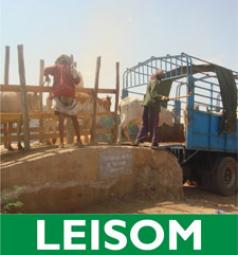Livestock Emergency Intervention to Mitigate Food Crisis in Somalia

Project Brief/Background
About LEISOM
The control and eradication of transboundary animal diseases is a key prerequisite to the effective utilization of animal resources. In addition, the provision of essential support to Member States with special needs or in emergency situations such as Somalia will ensure the fulfilment of the AU-IBAR mandate.
Rationale
Somalia keeps facing humanitarian crises in its recent history with over 3.6 million people in need of urgent humanitarian assistance and livelihood support. Somalia is also unable to produce sufficient cereals to feed its entire population and more than 50% of the cereal requirements come from commercial imports and food relief programmes. Hyperinflation has affected the prices of basic food commodities and the internationally soaring food prices has further exacerbated the humanitarian situation. The impact of high world food prices has been high in Somalia where food imports represent a significant percentage of domestic supplies.
Livestock is the mainstay of the Somali economy and the basis for the livelihoods of the largely pastoral and agro-pastoral population. The export of live animals and other livestock commodities generates the foreign currencies for importation of food items. Livestock marketing and trade also generate revenues for local administrations, through taxation of livestock destined for domestic and export markets. However, the terms of trade between livestock commodities and imported foods deteriorated due to soaring food prices that required poor livestock producers to sell more animals and animal products to procure the same amount of imported foodstuffs. This further depleted their already low asset holdings. Livestock disease outbreaks also cause heavy production losses that negatively affect the poor and their nutritional and health status.
In December 2008, the European Parliament and the Council adopted a Regulation (EC) No 1337/2008, establishing the "Food Facility" for rapid response to soaring food prices in developing countries. The Livestock Emergency Intervention to Mitigate the Food Crisis in Somalia (LEISOM) project was a joint initiative of AU-IBAR and the European Union (EU) under the EU Food Facility.
LEISOM contributed to efforts to mitigate the negative impact of the high food prices through:
- Enhanced livestock health by vaccination of sheep and goats against peste des petits ruminants (PPR), contagious caprine pleuropneumonia (CCPP) and sheep and goat pox, and treatment of livestock for endemic diseases that affect production.
- Support for rehabilitation of livestock marketing infrastructure and improvement of their management systems to enhance livestock trade.
These measures helped to preserve the most important productive assets of pastoralists, agro-pastoralists and the poor who depend on livestock for their livelihoods and thus, increase their incomes and enhance their resilience.
Synergies and complementarities
LEISOM complemented activities of the EU-funded SAHSP II, SERECU II and SOLICEP projects and the Danish Government funded Regions of Origin III project (Livestock Component). It also built synergies with related emergency interventions implemented by FAO-Somalia.
Modalities for implementation
The implementation of the LEISOM was coordinated by AU-IBAR in close partnership with the Somali veterinary authorities, relevant private sector actors and four international Non-Governmental Organizations (NGOs) namely, Cooperazione Internazionale (COOPI), Terra Nuova, VETAID and Veterinaires Sans Frontieres – Germany (VSF-Germany). AU-IBAR and the NGO implementing partners signed memoranda of understanding (MoUs) with the Somali veterinary authorities and the Livestock Professional Associations in Somaliland, Puntland and central/south Somalia to facilitate the implementation of field activities.
A project Steering Committee (SC) was established to provide the overall guidance on policy and strategy for the effective coordination, implementation, monitoring and evaluation of the project. The SC met under the chairmanship of the Director, AU-IBAR.
Sustainability
The project further strengthened existing local capacities and structures to respond to veterinary emergencies. In addition, the livestock marketing infrastructure facilities were established and managed through public-private partnerships that give greater responsibilities and incentives to the private sector for continued operation and management of the rehabilitated structures.
